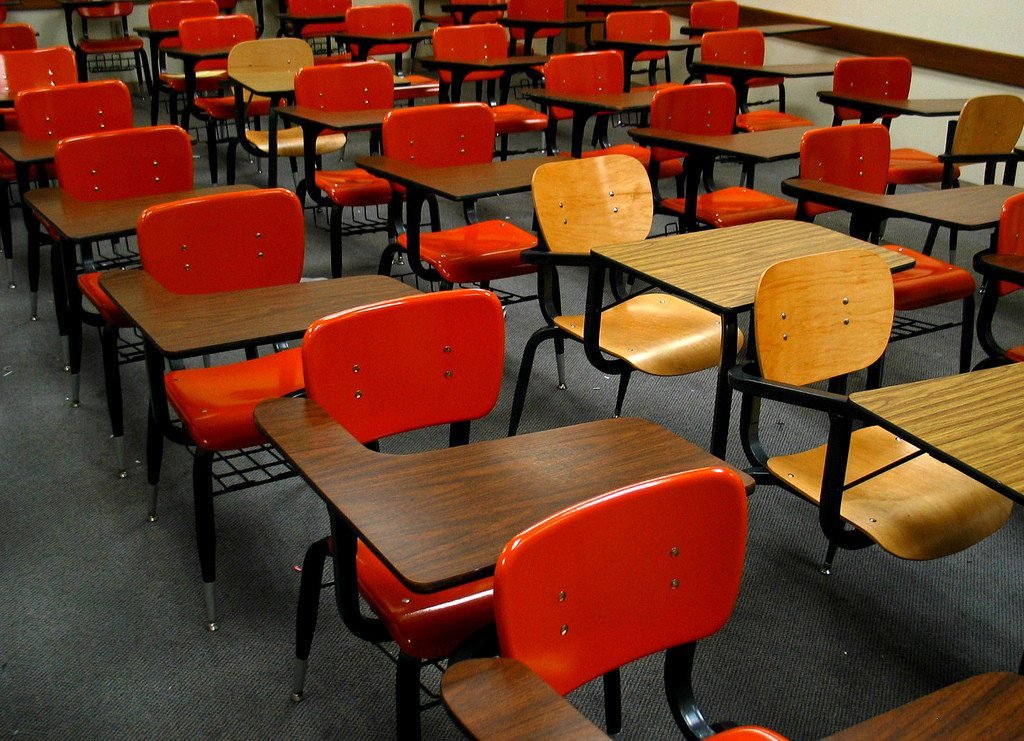Advice for Armenia Against Leading Western Educational Reform Tendencies
Special for the Armenian Weekly
Armenia needs talented youth in order to become a competitive player in the global market economy. The changing landscape of its schools due to school privatization, however, will eventually undermine its efforts. And here is why.
School privatization—a fashionable Western education reform tendency—will contribute to greater inequity in the Armenian education system, which will further put at risk the prosperity of its youth and its society.

Growing up in Armenia in the 1990’s, I remember walking to school with my friends from our neighborhood and learning in a classroom made up of children from diverse socio-economic backgrounds. It did not matter whether you came from a privileged or underprivileged family—we all had equal opportunities to receive a quality education and become competent citizens of our society.
In Armenia nowadays, however, more children from affluent families go to private schools and those who cannot afford the high price tag of more modern and academically rigorous alternative schools go to public schools. The latter lack the resources to be able to compete with the private schools, thus earning a reputation of being ineffective and less competent. Thus, because they cannot afford to attend the “better” schools, more and more disadvantaged Armenian children will miss the opportunity to attain better educational outcomes and better chances in life.
The proponents of these “school choice” and market-based principles, however, argue that school privatization creates competition, which intuitively leads to school improvements and better educational outcomes for all children. But some leading experts in the West argue that competition in the education sector simply does not work the same way as it does in other sectors of society.
After all, in competition, especially with unequal resources, someone always loses. And if such a corporate-style approach becomes a standard in the Armenian education sector as it is in most Western countries, who do you think will be the losers? It will be the majority of the Armenian children who will not have equal opportunities to grow into highly skilled and competent global citizens.
And if Armenia further encourages the rise of the private schools for a selected few and does not strengthen its public schools for all children, it will eventually lose its bid to become a world player in the global market economy. It just won’t have the talent it needs to achieve that goal.
What then can Armenia do to have a world-class education system? It can follow a different approach that renowned Finnish education expert Pasi Sahlberg recommends.
Armenia should build a strong public school system with equitable educational policies where the state, the teachers, and the schools work together collaboratively to ensure that all children have equal opportunities to receive high-quality education, regardless of their background. Armenia should also create highly competitive teacher education and rigorous teacher professional development programs to establish a highly qualified teacher workforce. It should also pay its teachers well enough to attract and sustain the talented professionals it needs. Almost all high-performing education systems in the world, including those of Finland, Singapore, South Korea, and Japan, do exactly that.
Can Armenia learn from these successful education systems? Certainly, yes! Its implementation of early childhood education programs—another key indicator of educational success—demonstrates that it can certainly borrow ideas from other countries, including those from the West. However, it should do so very carefully because not all Western ideas are good, as even some Western experts warn.



Maybe the Armenian churches need to establish schools, and contributions to the churches can provide scholarships to families that cannot afford the tuition.
The same can be said of other Armenian institutions – they can establish schools and scholarships.
Sometimes even well-funded public schools are not always the best in the rest of the world.
I believe only qualified teacher in Armenian society is not enough. Fist important step is to motivate the kids for a need of more educational perspectives in the future and than establish means of opportunities
To the minister of the education, please take the necessary action before it’s too late. Thank you.
This is a well-meaning article but quite wrong in many aspects. First, the main problem in Armenian public schools is not inequality but corruption. Second, if private schools proliferate, which they never do, that will mean that the society is affluent enough to afford them. Many rich folks have their kids in public schools, where they are treated better than the rest in their class. You can see many black SUVs and luxury cars dropping off kids at the public schools. It’s another story where these public schools are located. Good areas have better schools because they take advantage of the parents and their contributions (bribes). The only difference is that in private schools you pay the fee, in public schools you pay the bribes. So, this threat of Western education tendencies is nonsense. We have a lot of problems in Armenian education system, coming from the very-very top, and private schools are not one of them. I moved to Armenia from the US and live next to 2 public schools. I see who is attending them. Private is private but a few I know of have kids on scholarship as well. And their teachers and directors are not looking/demanding for handouts from parents.
Yes it is true that we need to educate our youth. I also agree that the public school system should have adequate resources to provide an education for those who can not afford an alternative private school. However, my experience is that competition in the market does work. Right now, the private schools are providing a better educational experience. The public sector in Armenia is highly corrupt , just like in many Western countries and that is why the public sector education is not as attractive.
Harry,
I totally agree with you, that corruption is a deeply rooted weed in Armenian public schools and highly jeopardizes education outcomes for a country, whose backbone has always been its human capital. However, I can give my own experience of a parent who took her first-grade daughter to an elite private school in Yerevan and felt bitterness at the low quality of instruction provided there. What is more, in return to my constructive feedback which could improve their methodology and consequently increase their competitiveness in the market, I was offered to opt for another school for my child. It was not surprising that at the end of the first year their class size decreased by one third. So, are private schools really competitive? Do they think about their quality? Or are they a safe haven for the offspring of the most affluent in Armenia, some of whom think that just sending a child to the most expensive school in Yerevan gives more significance to their opulence?
I totally agree with you guys, Ani, Andy and Harry, your observations are very accurate, and Ani you confronted a big issue by offering your opinion but dear that’s the biggest problem in Armenia which will bring its downfall…..As for Bedros Zerdelian, dear Bedig your concern and your call to the minister of education to take “necessary action is in vain, lately the guy is busy running a circus like TV show and does not have time to be concerned about the country’s education system or improving public schools…..according to him there is nothing wrong with them, then the citizens Of Armenia were wondering why is it then that his two children are attending private schools……..go figure…..
Thank you Hasmig Sarkisian to bring this issue in the spotlight